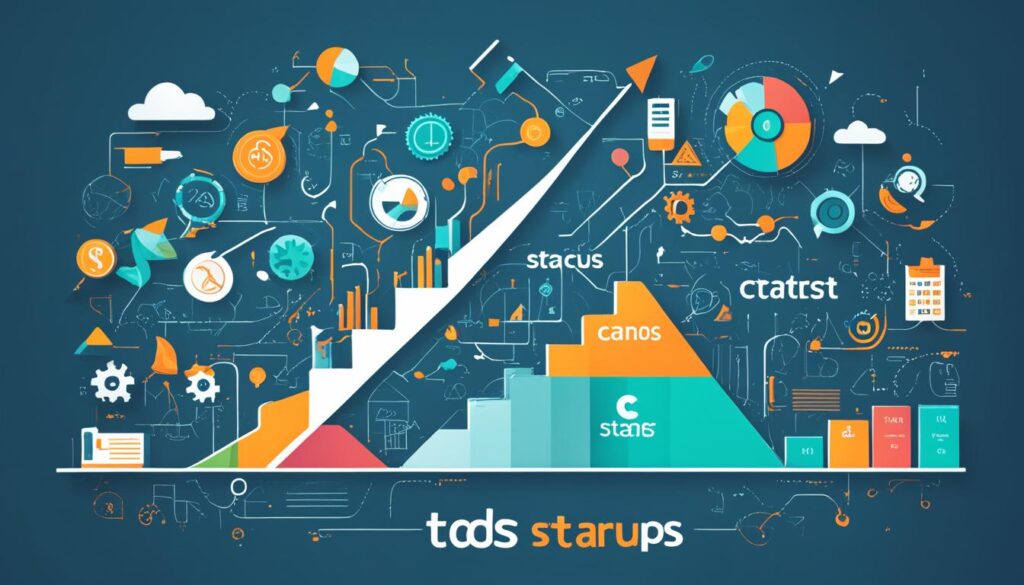Hyderabad , India
Starting a business makes us wonder: Do we really know how TDS for Startups India affects our money? It’s key to understand Tax Deducted at Source (TDS) for every founder. This article will explain TDS, its importance, and how startups can use tax deductions wisely.
Following TDS rules gives us big tax benefits for our business. We need to know about TDS rates and file our taxes on time. Being informed about TDS is a must for every new business. As taxes change, staying updated helps us succeed in our business journey.
Key Takeaways
- Understanding TDS is crucial for following tax laws.
- Filing TDS on time helps avoid fines and legal trouble.
- Knowing TDS rates for salaries and contractor payments is key for good money management.
- Using tax benefits can greatly lessen the financial load on startups.
- Startups must know the deadlines for filing TDS returns to stay legal.
- The latest Budget updates bring more tax perks for eligible startups.
- Grasping the TDS system helps us make smart choices for our startups.
Introduction to TDS
Understanding Tax Deducted at Source is key for startups in India. It helps collect taxes smoothly at the source. For us, knowing TDS well is crucial to avoid big financial penalties that could slow our growth.
The TDS rate is 2% for payments over Rs. 2,50,000. This is important for those selling goods or services. Government agencies and some public sector companies also need to pay TDS. We must pay TDS within 10 days after the month it was deducted, using Form GSTR-7.
Using startup tax benefits from TDS requires good record-keeping. The value for TDS doesn’t include tax on invoices. Not following these rules can lead to penalties, like an 18% interest charge and fines.
If we make a mistake with TDS, we can get back the extra we paid. Companies like Neusource Startup Minds India Ltd. help us with TDS. They make following the rules easier and keep us updated on tax changes. For startups, getting expert advice is very helpful.
| Criteria | TDS Rate | Threshold Payment | Compliance Deadline |
|---|---|---|---|
| General TDS under GST | 2% | Rs. 2,50,000 | Within 10 days of the following month |
| Applicable Entities | N/A | Governmental Agencies & Public Sector Undertakings | N/A |
| Penalties for Non-Compliance | Interest at 18% | N/A | As per law provisions |
| Refunds for Erroneous Payments | N/A | As per refund provisions | N/A |
What is TDS?
Tax Deducted at Source, or TDS meaning, is key for new businesses in India. It’s a way for the government to get income tax right away. Think of it as the tax the payer takes out before paying salaries or contractor fees. This makes tax collection easier and less stressful at the end of the year.
Knowing how TDS works is important for startups. It applies to many payments like salaries, rent, and professional fees. The deducted tax goes to the government. People, families, companies, and partnerships are all responsible for this.
Startups need to know the TDS rates for different payments. For salaries, it’s based on income tax slabs. But for contractor fees, it depends on the work and its cost. Understanding these rates helps with financial planning and running the business smoothly.
So, learning about TDS is crucial for startups. It helps us follow tax rules and run our businesses well.
The Importance of TDS for Startups India
TDS compliance is key for the financial health of startups in India. It’s crucial to understand our tax duties to build a solid business base. Following TDS rules helps us meet legal standards and builds trust with investors and clients.
Ensuring Compliance
All startups must take TDS from payments to employees and contractors as the law says. We must deposit this deducted amount and file quarterly returns. There are specific forms for different payments:
| Payment Type | TDS Form |
|---|---|
| Salaries | Form 24Q |
| Payments other than salaries (e.g., contractors) | Form 26Q |
| Payments to non-residents | Form 27Q |
It’s vital to keep track of deadlines to avoid TDS penalties. The filing dates change with each quarter:
- April-May-June Quarter by July 15
- July-August-September Quarter by October 15
- October-November-December Quarter by January 15
- January-February-March Quarter by May 15
Avoiding Penalties
Not following TDS rules can lead to big fines and disallowed expenses. These penalties can hurt our startup’s profits. To prevent this, following TDS rules is a must. By doing timely deductions and filings, we keep our finances healthy and protect our investment.
TDS Rates Applicable to Startups
Understanding TDS rates is key for startups to handle their financial duties well. TDS deductions change based on the income tax slabs for each employee. If an employee makes over ₹2.5 lakh a year, we must follow the tax rules to deduct taxes. To meet tax rules, precise payroll processing is crucial. Startups face many challenges, but knowing about TDS helps us manage our finances better.
Understanding Salary Deductions
TDS deductions have specific tax slabs that tell us how much tax to deduct. We can sort employees by their income to make this easier. Using cloud-based payroll systems helps keep track of tax rates and reduces errors. Staying updated on tax slabs and deductions helps startups manage their finances better.
TDS on Contractor Payments
TDS also applies to contractor payments, with different rates for different services. Knowing about contractor TDS helps us manage our finances well. Keeping detailed records of these payments helps with cash flow and follows the law. For more help on managing TDS and making smart financial choices, check out TDS management for startups.

Types of TDS Returns
It’s important for startups to know about TDS Forms in India. These forms help with tax rules. Knowing them helps avoid fines and ensures correct filing.
Each form is for a specific type of deduction. This makes tax work easier.
Form 24Q: TDS from Salaries
Form 24Q is key for reporting TDS on employee salaries. Companies in India must file this quarterly. It has two parts: Annexure-I and Annexure-II.
These parts list the deductor, deductees, and challans. They also list employee salaries. Filling out Form 24Q right helps with tax rules.
Form 26Q: TDS on Payments Other Than Salaries
Form 26Q is for TDS on payments not from salaries. This includes contractor payments, interest, and fees. It has one annexure with details on deductor, deductees, and challans.
Knowing how to file Form 26Q is key for clear finances.
Form 27Q: TDS on Non-Residents
Form 27Q deals with TDS on payments to non-residents. It covers things like interest and bonuses. Startups working with international taxes must file this accurately.
They need a PAN for non-government deductors. Government ones can skip it. Following these rules helps avoid fines and builds trust with foreign partners.
Deadlines for Filing TDS Returns
Knowing the TDS filing deadlines is key for startups to follow the rules. These deadlines make sure all business activities are in line with the law. This includes handling startup tax duties. Startups must remember the quarterly due dates for filing TDS returns, which are:
| Quarter | Period | Filing Deadline |
|---|---|---|
| Q1 | April – June | July 15 |
| Q2 | July – September | October 15 |
| Q3 | October – December | January 15 |
| Q4 | January – March | May 15 |
If you miss these deadlines, you could face big problems. You might get fined Rs. 200 per day until you file your TDS return. If you don’t file correctly, you could be charged between Rs. 10,000 to Rs. 1,00,000. Plus, you’ll have to pay interest at 1% per month on the TDS/TCS amount.
The TDS return filing happens every quarter. You can revise a TDS return at any time. Staying on top of these deadlines helps startups manage their taxes and avoid fines.
How to File TDS Returns for Your Startup
Filing TDS returns is key for startups to follow tax laws. It starts with getting a Tax Deduction Account Number (TAN). This number helps track and report deductions right. Getting TAN first helps manage taxes well.
Applying for a Tax Deduction Account Number (TAN)
To start filing TDS, we apply for a Tax Deduction Account Number. This is done online on the Income Tax Department’s website. The TAN makes sure all deductions are tracked right, avoiding fines for wrong filing. Following the rules makes getting TAN easy, helping us with our TDS duties.
Filing Process Using NSDL Software
After getting our TAN, we use NSDL software to file TDS online. This software makes filing TDS easy, helping us prepare and send returns right. Over 5,000 tax experts use NSDL, making our deductions management better. This tool helps us avoid mistakes by doing precise calculations and following the right formats.
| Step | Description |
|---|---|
| 1 | Apply for Tax Deduction Account Number (TAN) online. |
| 2 | Utilize NSDL software for preparing TDS returns. |
| 3 | Submit the TDS returns by the due dates outlined in the regulations. |
| 4 | Ensure timely payment of deducted taxes to avoid penalties. |
Understanding the TDS filing process with software helps us handle tax rules better. Knowing important deadlines and filing accurately helps our startups. It also prevents big penalties or issues.
For more info on taxes, check out this article on the Goods and Services Tax (GST) in India here.
Understanding Startup Tax Benefits
Knowing about startup tax benefits can really help a startup’s finances. The Startup India initiative has made it easier for startups to save money. They can get tax holidays and other breaks, letting them focus on growing their business instead of worrying about taxes. So far, startups have saved a huge ₹2500 crores thanks to these benefits.
Tax Holidays and Exemptions
Startups started between April 1, 2016, and March 31, 2022, get a 100% tax break on profits for three years. This is if their yearly turnover is less than ₹25 crores. They can also get tax breaks on profits from reinvesting gains into certain funds or other startups.
This helps reduce the tax load on these businesses. It also encourages innovation and growth in the startup world. Plus, startups get tax breaks on investments from angel investors. This helps them grow faster and contribute to India’s economy, which is now the fifth-largest in the world.
So, it’s important to know and use these tax benefits well. This way, we can make the most of our startup’s potential.
FAQ
What is TDS and why is it important for startups in India?
Tax Deducted at Source (TDS) is a tax taken from payments to employees and contractors in a startup. It’s key for following tax laws and avoiding big fines. TDS makes tax collection easier for the government and businesses.
How can startups ensure TDS compliance?
Startups can follow TDS rules by taking it from payments, paying it to the government, and filing returns. Doing this builds trust and protects against fines.
What are the penalties for failing to comply with TDS regulations?
Not following TDS rules can lead to fines, extra interest on late payments, and disallowed expenses. This can hurt a startup’s profits. So, it’s important to know the deadlines.
What are the TDS rates applicable to employee salaries?
TDS rates on salaries depend on the income tax slab of each employee. For those earning over ₹2.5 lakh a year, TDS must match the income tax rates.
Which forms are used to file TDS returns?
To file TDS returns, you use Form 24Q for salaries, Form 26Q for other payments, and Form 27Q for TDS on payments to non-residents. Each form has its own purpose and must be filled correctly for compliance.
What deadlines do startups need to be aware of for TDS returns?
Startups must meet quarterly TDS return deadlines: July 15 for April-June, October 15 for July-September, January 15 for October-December, and May 15 for January-March. Missing these can result in fines.
How does a startup apply for a Tax Deduction Account Number (TAN)?
Startups can get a TAN online from the Income Tax Department’s website. This number is key for tracking and reporting TDS accurately.
What tax benefits are available for startups under the Startup India program?
Eligible startups can get big tax benefits, like tax holidays that let them avoid income tax for a while. It’s important to know the rules to use these benefits well.








